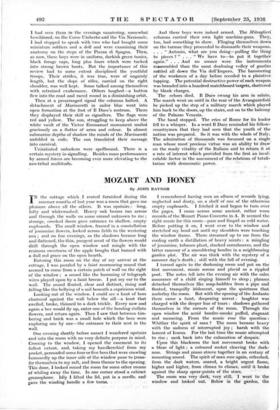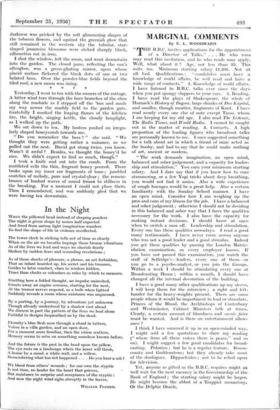MOZART AND HONEY
By JOHN RAYNOR
Entering this room on the day of my arrival at the cottage, I was puzzled by a faint murmuring sound that seemed to come from a certain patch of wall on the right of the window ; a sound like the humming of telegraph wires played upon by a faint breeze. I put my ear to the wall. The sound floated, clear and distinct, rising and falling like the bellying of a sail beneath a capricious wind.
Looking out of the window, I could see a knot of bees clustered against the wall below the sill—a knot that swelled:broke, thinned to a dark trickle. Every now and again a bee would fly up, enter one of the bending stellate flowers, and return again. Then I saw that between tim- bering and brick was a small hole which the bees were exploring one by one—the entrance to their nest in the wall.
One evening shortly before sunset I wandered upstairs and into the room with no very definite purpose in mind. Crossing to the window, I opened the casement to its fullest extent, and, taking my handkerchief from my pocket, persuaded some four or five bees that were crawling bemusedly up the inner side of the window pane to trans- fer themselves to my raft, and from thence to the opening. This done, I-looked round the room for some other means of whiling away the time. In .one corner stood a cabinet gramophone. Idly I lifted the lid, -put in a needle, and give the winding handle a few 'turns. I remembered having seen an album of records lying, neglected and dusty, on a shelf of one of the otherwise empty cupboards. I fetched it and began to turn over the pages. I came 'across some ancient, rather worn records of the Mozart Piano Concerto in A. It seemed the right music for this room—pure and limpid as cold water. Before putting it on, I went over to the window and stretched my head out until my shoulders were touching the window frame. There streamed up to me from the cooling earth a distillation of heavy scents : a mingling of jessaMine, tobacco plant, stacked cornsheaves, and the bitter rancour of a smouldering bonfire, in a neighbouring garden plot. The air was thick with the mystery of a summer day's death ; still with the fall of evening.
I turned again to the darkening room and put on the first movement, music serene and placid as a rippled pool. The notes fell into the evening air with the calm assurance of a child singing himself to sleep ; phrases, detached themselves like soap-bubbles from a pipe and. floated, tranquilly iridescent, upon the quietness that, underlay the room. But with the opening of the Andante. there came a faint, deepening unrest : laughter was charged with the deeper hue of tears : shadows gathered ' themselves in the corners of the room. Through the open window the acrid bonfire-smoke puffed, stagnant and menacing. From the music rose the question': Whither the spirit of man ? The room became heavy with the sadness of interrupted joy ; harsh with the lament of Icarus. For the last time the music attempted to rise ; sank back into the exhaustion of despair.
Upon this blackness the last movement broke with a blaze of light ; a coloured rocket cleaving the dark- ness. Strings and piano strove together in an ecstasy of mounting sound. The spirit of man rose again, refreshed, from the dark waters, soared, a bright urgent flame, higher and higher, from climax to climax, until it broke against the sharp spear-points of the stars.
The room was very dark, very still. I went to the window and ldoked out. Belo* in the garden, the darkness was pricked by the soft glimmering shapes of the tobacco flowers, and against the greenish glow that still ,remained in the western sky the tubular, star- shaped jessamine blossoms were etched sharply black, silhouettes cut in iron.
I shut the window, _left the room, and went downstairs into the garden. The closed pane, reflecting the sun's afterglow, was a green-glinting mirror, upon whose placid surface flickered the black dots of one or two belated bees. Over the powder-blue fields beyond the tiled roof, a new moon was rising. * * * Yesterday, I went to tea with the owners of the cottage. A bitter wind tore' through the bare branches of the elms along the roadside as I stepped off the 'bus and made my way across the muddy field to the garden gate. Gratefully I marked the leaping flames of the kitchen fire, the bright, singing kettle, the cloudy lamplight, as I walked up the path.
We sat down to tea. My hostess pushed an irregu- larly shaped honeycomb towards me.
," Do you remember the bees ? " she said. " We thought they were getting rather a nuisance, so we pulled out the nest. David got stung ;twice, you know. Wasn't it awful ? Besides, we thought the .honey'd be nice. We didn't expect to find so much, though."
I took a knife and cut into the comb. From the mutilated cells the thin, fragrant honey poured. There broke upon my inner ear fragments of tune ; jumbled snatches of melody, pure and crystal-clear ; the remem- brance of hushed waves of sound frozen-'to' stillness in the breaking. For a 'moment I could not place them. Then I remembered, and was suddenly glad that we were having tea downstairs.



















































 Previous page
Previous page